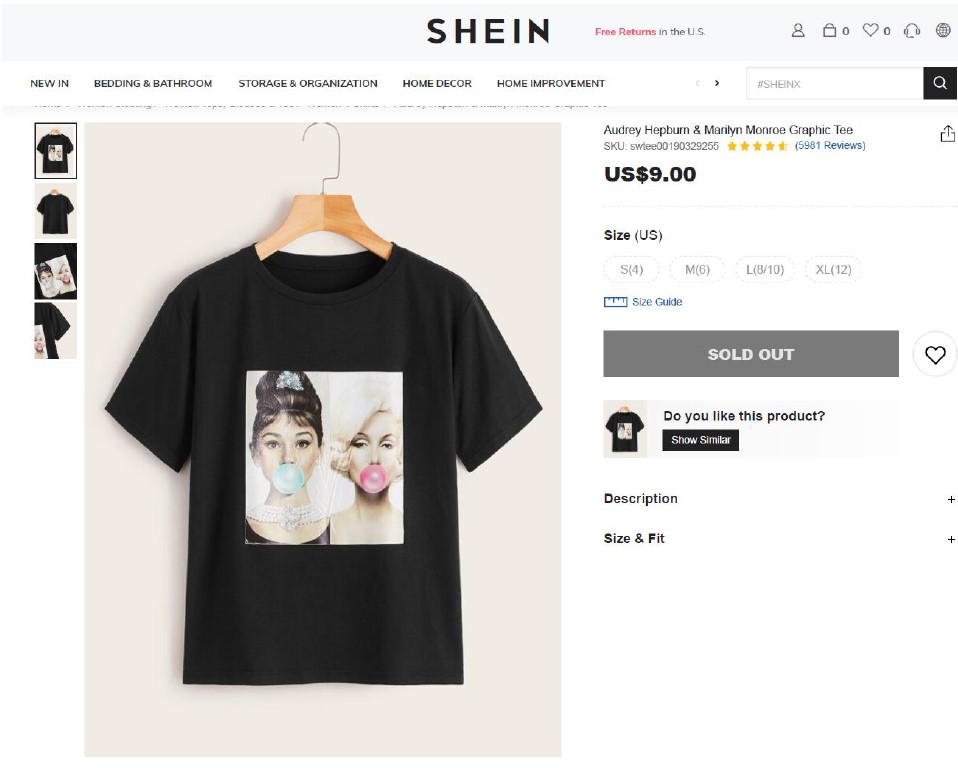
The German artist Michael Moebius, who was recently awarded $120 million in a lawsuit against hundreds of foreign companies, is taking the Chinese retailer Shein to court in a case that could set new precedents for how such companies can be sued in the United States.
Moebius filed his lawsuit against Shein last year alleging the retailer violated his copyrights for his artwork, including his best-known series depicting pop-culture icons blowing bubble gum. He submitted an amended complaint on Monday to the U.S. District Court for the Central District of California in a bid to stop the retailer from skirting liability through a complex web of companies.
“I hope this case sets another precedent that multinational companies must be responsible for all of their actions, not just in the area a lawsuit happens,” Moebius told Artnet News. “It would make no sense to need to file 40 to 50 lawsuits for one infringement.”
The amended complaint, 10 pages longer than what Moebius first filed, takes a much stronger stance against the controversial retailer, and comes after reports Shein was seeking to launch an initial public offering in the United States. Shein has denied the IPO rumors.
The court record shows Moebius’ lawyers are framing their arguments on two legal theories that have not been tested together: the delayed discovery rule and the so-called server test.
The statute of limitations for copyright infringement is three years, which is suspended under the delayed discovery rule to when the artist learned of the infringement. Moebius learned of Shein’s alleged infringement on Jan. 20, 2020, according to the amended document, which could entitle him to accrued damages.
Simultaneously, Moebius lawyers sought to establish that the infringement happened on U.S.-based servers, which could entitle him to recover damages from alleged violations outside the U.S. linked the domestic infringement.
If Moebius is successful with his lawsuit, other artists could similarly sue when their copyrights are violated by large, multinational retailers and other companies.
The amended complaint also names a new defendant, Singapore-based firm Roadget, which his lawyers claim is the intellectual property holding company tied to all Shein’s international entities—meaning Roadget could be liable for the possible damages— a hit to the retailer at a global scale.
Trademarks filed with the U.S. Patent and Trademark Office verified by Artnet News show Shein’s trademarks are registered to Roadget.
“We added Roadget to the complaint because they are the I.P. holding company of Shein and have been in a previous lawsuit with Shein,” Moebius told Artnet News.
Roadget joins the Shein Distribution Corporation, based in Delaware, and at least 100 other unnamed defendants in the lawsuit—which Moebius alleges are all Shein entities.
“Roadget markets and sells products in this judicial district through its website located at shein.com to millions of customers in California and in this District, and around the world,” the amended complaint reads.
Moebius’ lawyers said Roadget owned and operated the websites shein.com and us.shein.com, where the company advertised and sold its fraudulent copies of Moebius’ work.
The lawsuit notes Shein entities operate various domain names for different countries, including shein.co.uk in the United Kingdom, de.shein.com in Germany, shein.co.in in India, among others.
“Shein uses different copies of the same website to sell their products in different countries,” Moebius told Artnet News.
“Whatever reason it is done for, it makes it difficult to get justice in one shot, which should not be the case, especially considering we are talking about a $100 billion company.”
Michael MoebiusAladdin Sane (2017). Courtesy of the artist.
Moebius’s lawyers included a new screenshot of Shein’s alleged copyright infringement on Shein’s website. This seemingly insignificant addition is being used by Moebius’ lawyers to further draw attention to the technical electronic communications aspects of the case.
The amended complaint alleges the images on Shein’s product pages are hosted at domains including img.shein.com and img.ltwebstatic.com, which pinged to U.S. servers. The product listing pages themselves appeared on a variety of Shein’s domains globally, including us.shein.com and shein.co.uk.
The fact the images on Shein’s product pages globally are stored on U.S. servers is central to Moebius’ new complaint, and if proven at trial, is what could entitle Moebius to international damages.
“Plaintiff’s investigation reveals that without the images stored in the United States via img.shein.com and img.ltwebstatic.com, the Shein Entities would be unable to display the products it intended to sell, and eventually sell, in the United States and around the globe,” the amended complaint reads.
Additionally, Moebius’ lawyers in the original complaint had said they believed Shein entities were liable for allegedly stealing his designs because they “had the right and the ability to supervise such infringement” and a direct financial interest in the infringing conduct.
In the amended complaint, his lawyers added the defendants also had “the right to end any business relationship they had with any third parties that they know (or arguably know) are serial infringers.”
The complaint alleges Shein should not be protected by the Digital Millennium Copyright Act, or DCMA. Though it is not clear how Shein produced or sourced the allegedly infringing merchandise, his lawyers seem to have included the “third parties” provision to ensure the company is held liable for products sourced outside Shein.
Moebius’s lawyers are likely watching the progression of another lawsuit filed by artists Krista Perry, Larissa Martinez, and Jay Baron in a U.S. District Court in Los Angeles.
The artists allege the company violated federal laws for Racketeer Influenced and Corrupt Organizations, known as RICO, in a different approach to link Shein’s numerous alleged entities and tie the company to alleged practices such as sweatshop labor.
More Trending Stories:
Influencers Are Realizing That A.I. Might Not Be a Magic Money-Making Machine For Artists After All